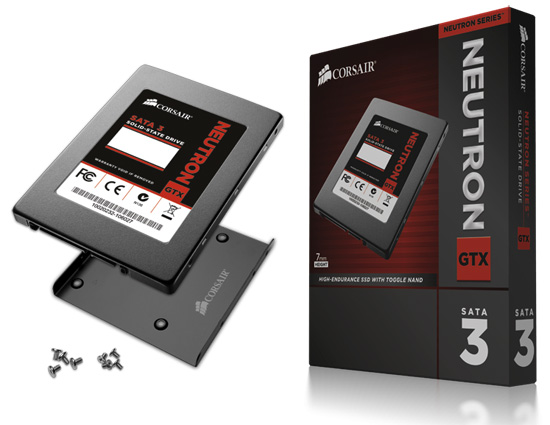Corsair Neutron GTX 240GB SSD RAID 0 Performance
When In Doubt, Double Up
We first had a look at the Corsair Neutron GTX drive in November of last year and found it to be a very fast drive and it even earned our Editor’s Choice award. Since then, Corsair has tweaked it a bit by moving to the smaller architecture 19nm Toshiba Toggle flash NAND from 25nm but otherwise it’s the same drive we reviewed. It’s been a quite awhile since we’ve done some RAID 0 performance tests on SSDs and since we multiple drives available, we decided to give it a go. There are still a fair amount of enthusiast users out there that like to push everything to the max so this will give a good example what you might see with a RAID 0 configuration with two top SSDs.

Running the show inside the drives are Link_A_Media Devices (LAMD) LM87800 controllers and unlike SandForce drives, they leverage an on board DRAM cache. LAMD states that it uses eBoost technology to improve drive endurance through proprietary “adaptive signal estimation techniques”. All in all, it makes for a speedy drive and so far we haven’t heard of any widespread issues with the controller and/or firmware. You can pick up a single drive for $220 for the 240GB drive.
Legit Reviews Storage Benchmark Test System
All tests were performed on a fresh and up-to-date install of Windows 8 Pro x64 with no other applications running while using RAID mode set through the BIOS. Benchmarks were run with the OS loaded on a 120GB Corsair Force SSD. In between every test, the test drives were secure erased using an instance of Parted Magic. As such, all results should be indicative of optimal performance. All components were set to their default speeds and are listed below.
| Intel LGA 1155 Test Platform | |||||
|---|---|---|---|---|---|
| Component | Brand/Model | Live Pricing | |||
|
Processor |
Core i5 2500k | ||||
|
Motherboard |
ASUS Maximus V Gene Z77 | ||||
|
Memory |
Kingston HyperX KHX16C9B1RK28 8GB | ||||
|
OS Drive |
Corsair Force 120GB (FW 2.4) | ||||
|
Power Supply |
Antec Basiq BP550W Plus-EC | ||||
|
Operating System |
Windows 8 Pro 64-Bit | ||||
ATTO v2.47
ATTO is one of the oldest drive benchmarks still being used today and is still very relevant in the SSD world. ATTO measures transfers across a specific volume length. It measures raw transfer rates for both reads and writes and places the data into graphs that can be very easily interpreted. The test was run with the default runs of 0.5KB through 8192KB transfer sizes with the total length being 256MB.

Benchmark Results: The numbers indicate that twice the drives nearly reaches twice the performance, but not quite. In our original single drive review, we saw reads hit 556MB/s and writes at 512MB/s.
Let’s have a look at some more benchmarks.

Comments are closed.